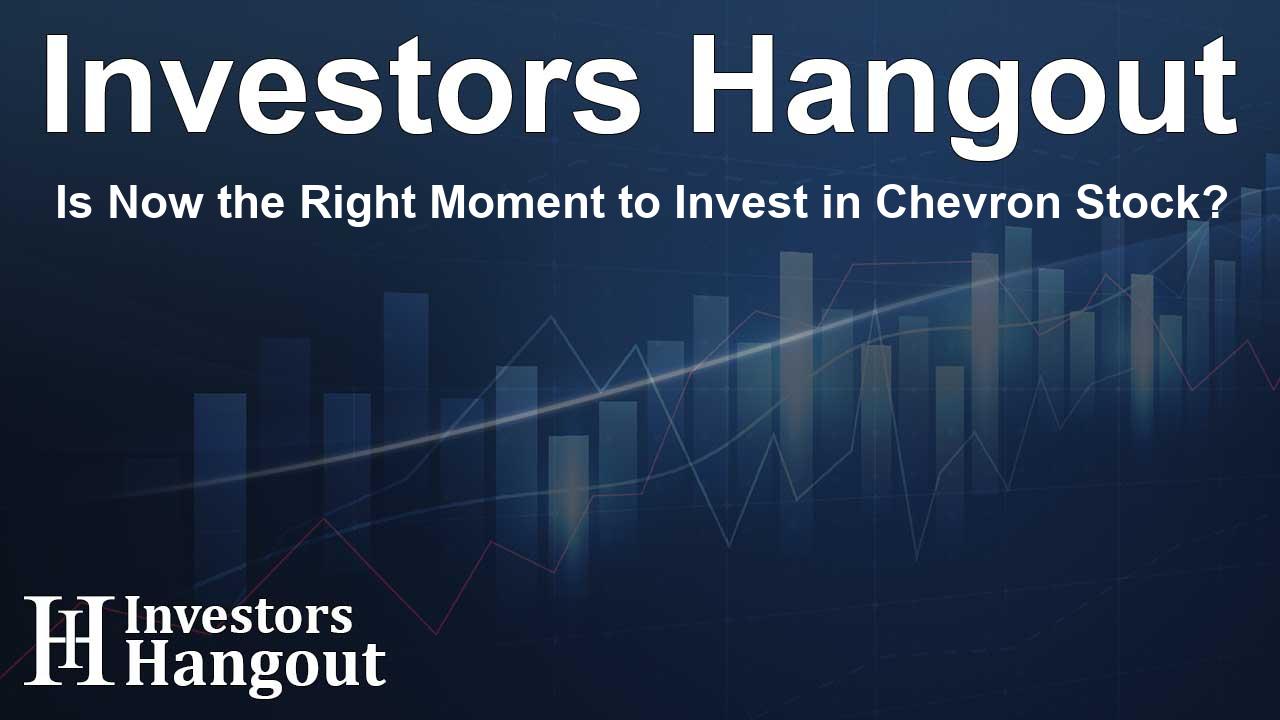Is Now the Right Moment to Invest in Chevron Stock?

Chevron: A Leader in the Energy Sector
Certainly, Chevron (NYSE: CVX) stands tall as one of the largest oil and natural gas enterprises globally. The firm boasts a long-term approach, emphasizing prudent financial management while consistently rewarding investors through steady dividend increases. This characteristic makes it an attractive option for those interested in energy stocks. Even though there have been times when Chevron's shares were priced lower, present conditions suggest that now is still a good opportunity to consider adding this stock to your investment portfolio.
Evaluating the Right Time to Buy Chevron
Identifying whether it is a good time to acquire shares in Chevron relies heavily on market valuation trends. While certain periods may reflect a more favorable price point than others, Chevron remains a captivating prospect from a broader energy market perspective. As an integrated energy company, Chevron’s operations span across every segment of the energy sector, including upstream oil and natural gas production, midstream energy transportation, and downstream chemical refining. Each segment tends to react differently based on market conditions.
Coping with Industry Volatility
A remarkable feature of Chevron's diversified business model is its capacity to weather the fluctuations inherent in the energy market. As lower oil and gas prices can negatively impact upstream operations, they tend to favor the downstream segment. Meanwhile, the midstream sector tends to generate steady cash flows, providing consistent financial health across various market cycles. Thus, Chevron's extensive operations soften the impact of the volatile commodity prices.
A Robust Financial Foundation
Another compelling reason to invest in Chevron is its superior financial standing relative to peers. With a low debt-to-equity ratio of approximately 0.15, Chevron possesses the financial flexibility to navigate downturns in the industry while still fulfilling its dividend obligations. Impressively, the company has raised its dividend every year for 37 consecutive years, showcasing its resilience amid varying energy price swings.
Current Valuation Indicates Reasonable Pricing
At present, while Chevron may not be heralded as a screaming buy, it appears reasonably priced within the current market context. Given the inherent unpredictability of energy sector earnings, conventional valuation metrics may offer limited insights. However, the consistency of Chevron’s dividend yield may serve as a better metric for assessing value. Presently, Chevron's dividend yield sits around 4.6%, surpassing its 10-year average of about 4.2%, hinting that shares might be attractively priced.
Understanding Market Sensitivity
While Chevron maintains a diversified portfolio, it is crucial to acknowledge that its earnings are closely tied to oil and gas prices. Higher energy prices typically lead to increased earnings, whereas lower prices result in diminished earnings. Historical trends suggest that strategic buying opportunities usually arise during energy downturns, where yield can spike significantly, providing enticing entry points for investors willing to adopt a contrarian stance.
Reasons to Consider Chevron for Your Portfolio
If your investment strategy revolves around timing the energy market's peaks and troughs, Chevron might not align with your objectives. Rather, this company excels in delivering extensive exposure to the energy market supported by a dependable dividend stream throughout various economic cycles. As it is currently offering a yield above average, now may be an opportune time to consider adding Chevron to your investment roster.
Investment Considerations for Chevron Stock
Before deciding to purchase shares in Chevron, it's essential to reflect on your investment strategy and goals. This firm provides a solid foundation for steady growth and reliable dividend income. While some experts may highlight other stocks offering potentially higher returns, like those they recently identified, Chevron remains a strong contender, particularly for investors focusing on energy exposure.
Frequently Asked Questions
1. Why is Chevron considered a good investment?
Chevron is known for its stability, strong financial performance, and consistent dividend increases, making it a reliable choice for investors seeking energy exposure.
2. How does Chevron's dividend compare historically?
Chevron has raised its dividend for 37 consecutive years, highlighting its commitment to shareholder returns and stability during fluctuating energy prices.
3. What factors affect Chevron's stock price?
Chevron's stock price is influenced by global oil and gas prices, market sentiment, and overall economic conditions within the energy sector.
4. Is now a good time to buy Chevron stock?
Current valuations suggest that Chevron is reasonably priced, with an attractive dividend yield, making it a potential buy for long-term investors.
5. What should investors consider when buying Chevron?
Investors should assess their investment strategy, the company's financial health, and market conditions, particularly the energy sector's volatility.
About Investors Hangout
Investors Hangout is a leading online stock forum for financial discussion and learning, offering a wide range of free tools and resources. It draws in traders of all levels, who exchange market knowledge, investigate trading tactics, and keep an eye on industry developments in real time. Featuring financial articles, stock message boards, quotes, charts, company profiles, and live news updates. Through cooperative learning and a wealth of informational resources, it helps users from novices creating their first portfolios to experts honing their techniques. Join Investors Hangout today: https://investorshangout.com/
Disclaimer: The content of this article is solely for general informational purposes only; it does not represent legal, financial, or investment advice. Investors Hangout does not offer financial advice; the author is not a licensed financial advisor. Consult a qualified advisor before making any financial or investment decisions based on this article. The author's interpretation of publicly available data shapes the opinions presented here; as a result, they should not be taken as advice to purchase, sell, or hold any securities mentioned or any other investments. The author does not guarantee the accuracy, completeness, or timeliness of any material, providing it "as is." Information and market conditions may change; past performance is not indicative of future outcomes. If any of the material offered here is inaccurate, please contact us for corrections.